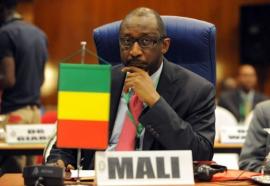
By Ola Awoniyi (AFP)
Abuja – West African nations on Friday plotted a military force to retake Islamist-occupied northern Mali as ministers met on a strategy that included a possible expanded mission of 5,500 troops.
The proposal discussed by foreign and defence ministers from the 15-nation Economic Community of West African States (ECOWAS) could see the bloc commit 3,200 troops and other countries a further 2,300, said a source familiar with the talks.
Representatives from South Africa, Mauritania, Morocco, Libya, Algeria and Chad would also be invited to participate in a regional summit on the military strategy set for Sunday in the Nigerian capital Abuja, the source said.
“ECOWAS defence chiefs have proposed a change in the composition of the troops to be deployed,” the source from the bloc said on condition of anonymity because he was not authorised to provide details.
“They are recommending to the summit 5,500 troops as against the initial proposition of 3,200 by ECOWAS. The difference is expected to be contributed by non-ECOWAS states which have signified interest to contribute troops.”
The ministers’ meeting ended late Friday after adopting a report ahead of Sunday’s summit. A portion of the report seen by an AFP journalist stressed that talks were the preferred means to resolve the crisis, but warned “dialogue was not open-ended.”
It spoke of a “leading role” for Mali in military and diplomatic efforts as well as “the leadership role of ECOWAS in the deployment of an African-led international force.”
The leader of a Malian militia meanwhile said that local people were ready to rise up against the Islamists.
“The local population is ready to go to war against these people because they’ve finally understood that they’re not dealing with Muslims but terrorists,” Seydou Cisse, the leader of the Ganda-Iso self-protection militia in northern Mali, told AFP from Niger’s capital Niamey.
Cisse, whose militia was defeated by the Islamists when they seized control of the region, said he was in “advanced talks” with authorities in Niger and Mali for his troops to take part in a military intervention.
“We have 2,000 young men assembled in Mopti [central Mali] and ready to fight. The sons of the territory must liberate their area,” he said, calling war “inevitable”.
The military plan discussed at the meeting in Abuja on Friday would eventually be sent for approval at the United Nations security council, which on 12 October set a 45-day timeframe for ECOWAS to come up with a blueprint for intervention. It would be delivered through the African Union’s peace and security council.
At the same time, attempts at dialogue are ongoing to resolve the Mali crisis, which analysts have warned poses potential problems to other countries in west Africa at risk of violence from Islamist extremists.
“The urgent need to halt the mafia and criminal practices of terrorist groups and the atrocities committed with impunity by the extremists requires a strong mobilisation on behalf of Mali,” ECOWAS Commission President Kadre Desire Ouedraogo said at the opening of Friday’s talks.
He said ECOWAS should pursue a dual approach of dialogue and military pressure allowing it to “stand by Mali… and help her regain her territorial integrity (and) dismantle terrorist networks.”
On Thursday, UN special envoy for the Sahel Romano Prodi, the former Italian prime minister and ex-president of the European Commission, said every effort would be made to avoid military intervention.
Prodi made the comments after meeting Algerian President Abdelaziz Bouteflika on Mali. Algeria is seen as important to any military operation, but it has been hesitant to get involved, preferring a negotiated solution.
While not a member of ECOWAS, Algeria is seen as key due to its superior military capabilities, intelligence services and experience battling Islamist extremism. Algeria also shares a 1,400-kilometre border with Mali.
The ECOWAS military strategy presented to the ministers on Friday was drawn up with the help of experts from the European Union, African Union, UN and the region, and adopted by regional army chiefs this week.
The French defence ministry said foreign and defence ministers from five European countries (Germany, Poland, Spain, Italy and France) would meet on 15 November to discuss a European mission aimed at training Malian troops.
The mission could include 200 soldiers and begin in January, said an aide to French Defence Minister Jean-Yves Le Drian.
Mali rapidly imploded after a coup in March allowed Tuareg desert nomads, who had relaunched a decades-old rebellion for independence, to seize the main towns in the north with the help of Islamist allies.
The secular separatists were quickly sidelined by the Islamists, who had little interest in their aspirations for an independent homeland and set about implementing their version of strict sharia law.
Worried that the area roughly the size of France could become a sanctuary for Al-Qaeda-linked groups, Mali’s neighbours and western powers are keen to drive the radicals out.

